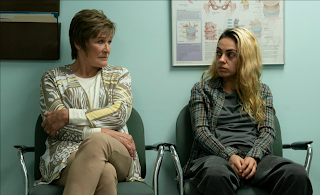After a one year absence, 31-year-old heroin addict Molly Wheeler (Mila Kunis) shows up at the suburban house of her mother Deb (Glenn Close), pleading for help. Molly has been living on the streets but wants to again try to get clean. Deb has been through this many times and knows her daughter is a prolific liar. Against the advice of her husband Chris (Stephen Root), Deb nevertheless accompanies Molly to the clinic and a 14th attempt at detoxification.
This time Molly is offered a shot that would block her body's heroin urges for a month, but to avoid severe medical complications she can only take the shot if she remains clean for four more days. Deb agrees to take Molly into her house and watch her for the four crucial days. Mother and daughter start to reconnect, but every hour feels like eternity for a craving addict and her distrustful mom.
Inspired by a true story and Eli Saslow's newspaper article, Four Good Days tries hard but cannot quite shake a television movie-of-the-week small-scale feel. Director Rodrigo Garcia co-wrote the screenplay with Saslow, and dutifully hits all the expected notes of frustration, lack of trust, exhaustion, mind games, and blame percolating within a family ravaged by addiction. It's all heartfelt and rings true, but the story never rises above the familiar.In the two central performances Mila Kunis and Glenn Close add a quality gloss. Kunis dances on the edge of despair and self-hate, while Close is grounded but not beyond falling for the euphoria of false hope. Other characters do interact with Molly and Deb, including Deb's husband Chris and Molly's ex-husband Sean, but this is essentially a two-character movie.
At regular intervals Garcia reveals past mistakes and personality traits as factors possibly contributing to Molly's surrender to drugs. Deb had fled a dysfunctional marriage, leaving her fragile daughter emotionally alone and disoriented. Already an anxious teen, substance abuse filled the vacuum of abandonment and worry. In keeping with the film's generally subdued stance, the finger pointing is mostly self-administered. Other revelations expose the horrors of a descent into a pathetic life where the only thing that matters is securing the next hit, but the lowlights are described rather than shown.
The aesthetics are suitably stark and flat, any sense of optimism crushed by the impressive strength of a brain in crisis. Four Good Days is a start, but the recovery timeline is riddled with doubt.
All Ace Black Movie Blog reviews are here.














No comments:
Post a Comment
We welcome reader comments about this post.